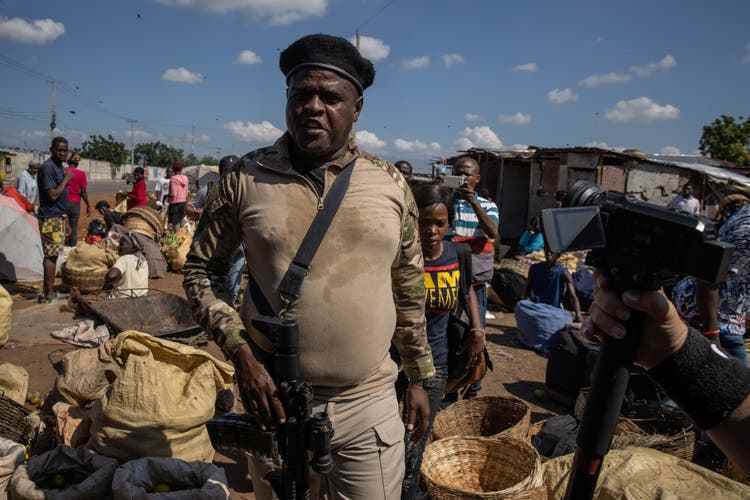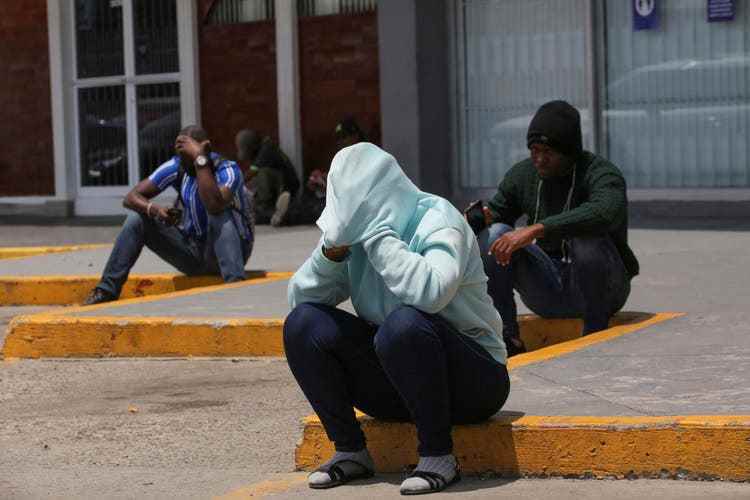The world is currently being hit by so many crises that little attention is paid to the desperate situation of the civilian population in Haiti. She is hostage to violence and anarchy, mismanagement and corruption. And nobody wants to help the failed state.
And always violence. – Gang warfare on the streets of Port-au-Prince
During his visit to Canada, Pope Francis asked forgiveness on behalf of the Church for human rights abuses committed against indigenous people. He spoke of a genocide that has killed 4,000 indigenous children who have been separated from their parents since compulsory schooling for indigenous people was introduced.
That’s a lot and yet little when you consider that in just ten days in July, 470 people, mostly women and children, were killed, tortured and raped in gang wars in Cité Soleil, a slum in Haiti’s capital Port-au-Prince , decapitated or burned alive. Bulldozers rolled down the slum shacks, and armed youths belonging to rival gangs shot anything that moved.
No consolation for the victims
Jonah, a single teenage mother, escaped at the last second, but her baby was hit by bullets and she buried him in a box on the beach. The fighters were and are better equipped than the police, and the riots spread to the city center with the government palace, the central bank and the Penitentiaire National overflowing with criminals. “If this isn’t hell, where else is it,” shouts a local resident, but the international community looks the other way because Haiti is just a footnote in history and the Ukraine war is causing far more deaths.
It almost seems as if the atrocities of slavery and the war of liberation will continue to curse future generations.
Comparing death tolls against each other is morally questionable because nobody knows where the line is between civil war, massacre or genocide. And compared to the Shoah, the attempted extermination of the European Jews, the hundreds of thousands of dead in Rwanda and Cambodia are almost negligible in quantity.
Pope Francis therefore speaks of a cultural genocide, because the Turkish genocide against the Armenians, for example, was not aimed at their physical annihilation but at the annihilation of their culture, similar to the actions of the Spaniards against the Aztecs and Incas or the suppression of the Herero uprising in German South West Africa.
But such differentiations are no consolation for the victims and do not absolve the genocides of their responsibility. The International Court of Justice in The Hague not only punished Serbian perpetrators, but also warlords from Africa for crimes against humanity.
What is happening in Haiti is not a cultural genocide – music, painting and literature flourish despite the excesses of violence – but a creeping genocide: the accelerating downward spiral of a failed state, inspired by the ideals of the French Revolution in 1804 by ex-slaves founded, fell prey to power-hungry elites and foreign interference.
It is not the government that is in charge in this country, but criminal gangs that control thoroughfares and use the slums as depots for weapons and drugs, hideouts for hostages and to recruit child soldiers. The police are part of the problem, not the solution, and those who refuse to pay tolls or bribes and get in the way of a gang called the G9 or GPEP have forfeited their lives. Their leaders, led by Jimmy Chérizier aka Barbecue, give interviews on TV, brag about their victories and compare themselves to the champions of slavery and independence.

Band leader Jimmy “Barbecue” Cherizier in Port-au-Prince.
What remains is gallows humor
Everyday life in Haiti has become unlivable. For example, Emily, my late Aunt Lucienne’s maid, bought a piece of land in Croix-des-Bouquets with her life savings and built herself a small house, which when completed was burned down in fighting for control of the road to Port-au-Prince . And her niece, a highly gifted ballet dancer, was infected with AIDS by her fiancé and had to die because anti-HIV drugs are unaffordable.
It’s not easy to write about Haiti when you love the island nation and, like me, have family ties there. At the end of the 19th century, my grandfather settled here as a pharmacist and botanist and married a local woman. At that time, Haiti had almost a million inhabitants, today it is an estimated 15 million. The country, smaller than the neighboring Dominican Republic, is overpopulated and ecologically destroyed by overexploitation, a poor house and a source of social unrest that can neither be contained nor ignored in the long term.
Rejecting the boat people that US coastguards first rescue from distress at sea and then ship to Guantanamo or Port-au-Prince does not solve the problem. And Haiti’s vital culture cannot compensate for the misery; this hits the most vulnerable parts of post-colonial society. As if the atrocities of slavery as well as the war of liberation continued as a curse for future generations.
What makes life bearable, however, is the gallows humor of the Haitians, who describe their country as the world’s best nightmare or as confirmation of the theory of chaos – chaos, they say, predates order and always reasserts itself.

Haitian emigrants detained in the US illegally crossing the border into Mexico.
The writer Hans Christopher Buch lives in Berlin. His volume of essays “Nocturnal Noises in the Jungle” was published by Transit Verlag in 2022.
